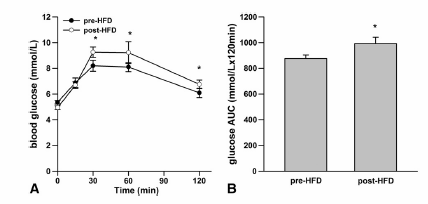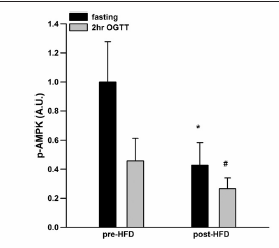OK, I’m not getting that from the actual study. Here’s some takeaway quotes:
These findings indicate that dietary modulation can influence AMPK activation in circulating immune cells, and that inducing relative glucose intolerance in lean healthy young males through short-term HFD appears to reduce, and not increase, inflammatory MAPKs activation in PBMCs following glucose ingestion.
However, contrary to our hypotheses, the greater rise in blood glucose following glucose ingestion after the HFD (i.e. relative glucose intolerance) led to blunted MAPKs signalling. Activation of MAPKs and inflammatory pathways in PBMCs following acute glucose ingestion has previously been shown to be higher in obese individuals with glucose intolerance compared to lean counterparts [19,20]. Our findings indicate that these previous findings may not be related to exaggerated hyperglycemia per se, but may be related to underlying pathologies associated with obesity and/or insulin resistance.
Didn’t they find exactly the opposite?? I’m confused here, because I don’t have a solid grasp of the inflammatory pathways involved. What I’m reading says ‘yes, PIR happens’ but ‘no it doesn’t cause inflammatory response in healthy men.’
Actual data:

“We were originally looking for things like an inflammatory response or reduced tolerance to blood glucose,” Durrer said. “What we found instead were biomarkers in the blood suggesting that vessel walls were being damaged by the sudden spike in glucose.”
And which markers are those?






